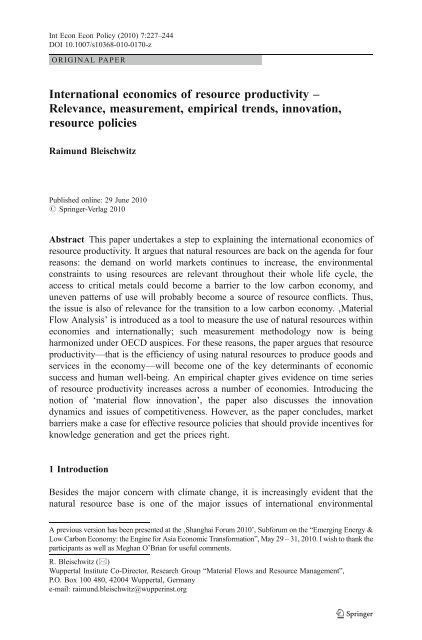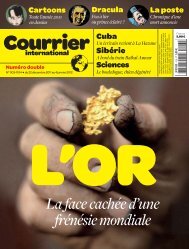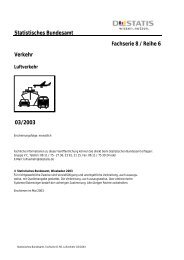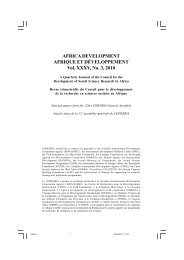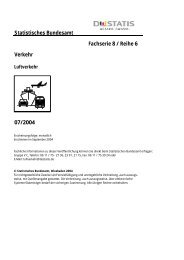The international economics of resources and resource ... - Index of
The international economics of resources and resource ... - Index of
The international economics of resources and resource ... - Index of
Create successful ePaper yourself
Turn your PDF publications into a flip-book with our unique Google optimized e-Paper software.
Int Econ Econ Policy (2010) 7:227–244<br />
DOI 10.1007/s10368-010-0170-z<br />
ORIGINAL PAPER<br />
International <strong>economics</strong> <strong>of</strong> <strong>resource</strong> productivity –<br />
Relevance, measurement, empirical trends, innovation,<br />
<strong>resource</strong> policies<br />
Raimund Bleischwitz<br />
Published online: 29 June 2010<br />
# Springer-Verlag 2010<br />
Abstract This paper undertakes a step to explaining the <strong>international</strong> <strong>economics</strong> <strong>of</strong><br />
<strong>resource</strong> productivity. It argues that natural <strong><strong>resource</strong>s</strong> are back on the agenda for four<br />
reasons: the dem<strong>and</strong> on world markets continues to increase, the environmental<br />
constraints to using <strong><strong>resource</strong>s</strong> are relevant throughout their whole life cycle, the<br />
access to critical metals could become a barrier to the low carbon economy, <strong>and</strong><br />
uneven patterns <strong>of</strong> use will probably become a source <strong>of</strong> <strong>resource</strong> conflicts. Thus,<br />
the issue is also <strong>of</strong> relevance for the transition to a low carbon economy. ‚Material<br />
Flow Analysis’ is introduced as a tool to measure the use <strong>of</strong> natural <strong><strong>resource</strong>s</strong> within<br />
economies <strong>and</strong> <strong>international</strong>ly; such measurement methodology now is being<br />
harmonized under OECD auspices. For these reasons, the paper argues that <strong>resource</strong><br />
productivity—that is the efficiency <strong>of</strong> using natural <strong><strong>resource</strong>s</strong> to produce goods <strong>and</strong><br />
services in the economy—will become one <strong>of</strong> the key determinants <strong>of</strong> economic<br />
success <strong>and</strong> human well-being. An empirical chapter gives evidence on time series<br />
<strong>of</strong> <strong>resource</strong> productivity increases across a number <strong>of</strong> economies. Introducing the<br />
notion <strong>of</strong> ‘material flow innovation’, the paper also discusses the innovation<br />
dynamics <strong>and</strong> issues <strong>of</strong> competitiveness. However, as the paper concludes, market<br />
barriers make a case for effective <strong>resource</strong> policies that should provide incentives for<br />
knowledge generation <strong>and</strong> get the prices right.<br />
1 Introduction<br />
Besides the major concern with climate change, it is increasingly evident that the<br />
natural <strong>resource</strong> base is one <strong>of</strong> the major issues <strong>of</strong> <strong>international</strong> environmental<br />
A previous version has been presented at the ‚Shanghai Forum 2010’, Subforum on the “Emerging Energy &<br />
Low Carbon Economy: the Engine for Asia Economic Transformation”, May 29 – 31, 2010. I wish to thank the<br />
participants as well as Meghan O’Brian for useful comments.<br />
R. Bleischwitz (*)<br />
Wuppertal Institute Co-Director, Research Group “Material Flows <strong>and</strong> Resource Management”,<br />
P.O. Box 100 480, 42004 Wuppertal, Germany<br />
e-mail: raimund.bleischwitz@wupperinst.org


